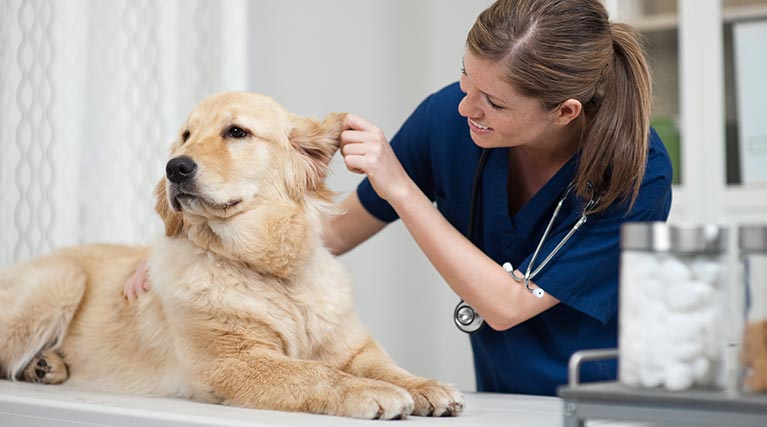Maintain Your Pet Healthy And Balanced with Routine Pet Health Checkups from Trusted Vets
Maintain Your Pet Healthy And Balanced with Routine Pet Health Checkups from Trusted Vets
Blog Article
Inoculation Guidelines From Your Relied On Vet
Vaccination standards provided by your relied on veterinarian play a critical role in guarding your pet dog's health and wellness and health. Core vaccinations are essential for all pets, while non-core vaccines can be tailored to details lifestyles and ecological exposures. Comprehending the subtleties of inoculation routines, which begin as early as six to 8 weeks, is crucial for ideal security. In addition, resolving typical false impressions bordering injections can even more enhance pet proprietors' self-confidence in these precautionary procedures. As we check out these essential aspects, it becomes increasingly clear why regular consultations with your veterinarian are important for notified decision-making.

Significance of Inoculations
Inoculations play an essential duty in safeguarding pets versus a variety of avoidable illness. By boosting the immune system to recognize and combat certain microorganisms, vaccines dramatically lower the incidence of contagious conditions that can influence an animal's health and wellness and durability. Not only do inoculations secure specific animals, yet they likewise contribute to herd resistance, therefore reducing the general prevalence of conditions in the animal population.
Timely inoculations assist to reduce the spread of illness such as rabies, parvovirus, and distemper, which can have severe consequences for both animals and people. Vaccinations are typically a requirement for boarding facilities, grooming solutions, and dog parks, making them crucial for those who want to mingle their animals.

Core Injections for Family Pets
While the specific vaccination requirements of family pets can differ based on private factors, core vaccines are widely suggested to shield versus one of the most typical and severe conditions (Emergency Vet). Core injections are those deemed important for all family pets, regardless of their lifestyle or geographic area, as they protect against possibly fatal and extremely infectious diseases
For pet dogs, the core injections consist of those for canine distemper, parvovirus, adenovirus (liver disease), and rabies. Adenovirus can result in liver illness, while rabies is a zoonotic condition that postures a threat to both humans and pets.
In cats, core vaccinations encompass feline panleukopenia, feline calicivirus, feline herpesvirus (rhinotracheitis), and rabies. Feline panleukopenia is a highly contagious viral illness that influences the body immune system and intestinal tracts. Calicivirus and herpesvirus are major factors to upper respiratory system infections in felines, while rabies stays a crucial worry for public health.
Seek advice from your veterinarian to ensure your animals obtain their core inoculations on schedule.
Non-Core Vaccines Explained
Non-core injections are customized to address particular threats linked with a family pet's direct exposure, way of living, and environment to specific diseases. Unlike core injections, which are widely advised for all pet dogs, non-core vaccinations are thought about based on private conditions. These injections are specifically essential for family pets that might encounter distinct virus due to their geographical location, traveling practices, or tasks.
Instances of non-core injections include those for Bordetella bronchiseptica, which is linked to kennel coughing, and Lyme illness, triggered by ticks. Pet dogs that frequently engage with other animals, such as those in boarding my latest blog post centers, canine parks, or brushing settings, may profit from Bordetella inoculation. If you live in a location where Lyme illness is prevalent, immunizing versus this condition can be a sensible choice for outdoor-loving dogs.
Various other non-core vaccines may include those for leptospirosis, canine flu, and feline leukemia, depending upon the details danger aspects present. It is important to have a thorough discussion with your veterinarian about your pet's lifestyle and the possible need for these injections, making certain a customized inoculation method that best protects your hairy buddy.
Vaccination Schedule Summary

As family pets develop, it is vital to abide by the suggested booster inoculations. Vet Enterprise. For grown-up pets, core vaccinations are typically given every one to 3 years, relying on the particular vaccine and regional regulations. Non-core vaccinations may be recommended based upon lifestyle variables and local illness frequency, requiring a tailored strategy
Routine veterinary exams are critical for upgrading inoculation timetables. Your vet can give advice on one of the most proper booster shots for your pet, considering age, wellness standing, and environmental threats. By staying proactive and educated, pet dog owners can guarantee their furry friends receive prompt and effective inoculations, therefore safeguarding their wellness and well-being throughout their lives.
Typical Misconceptions Concerning Injections
Misunderstandings concerning pet vaccinations can bring about confusion and unwillingness among pet owners pertaining to the booster shot procedure. One common myth is that vaccines are unneeded for indoor pets. While it's true that indoor pet dogs face reduced threats, they are not entirely unsusceptible to conditions, as microorganisms can be introduced via different ways, consisting of human apparel and various other animals.
Another misunderstanding is that vaccines can create the conditions they intend to stop. In truth, most injections contain inactivated or attenuated microorganisms, which can not create disease in healthy and balanced pets. Some family pet proprietors also believe that their pets need to not be immunized if they are currently healthy; however, vaccinations are a proactive step that helps protect against the onset of health problem.
In addition, visit homepage many family pet owners fear that injections will certainly lead to long-term health issues. The benefits of vaccination-- safeguarding pet dogs from potentially serious diseases-- far exceed the dangers.
Conclusion
In recap, adherence to inoculation standards is vital for guaranteeing the health and long life of animals. Core injections offer crucial security against significant conditions, while non-core injections deal with certain dangers based upon private lifestyles. Developing an extensive inoculation schedule, in combination with regular veterinary check-ups, promotes ideal wellness management. Resolving usual myths surrounding vaccinations further strengthens the significance of notified decision-making in pet care. Ultimately, a proactive approach to vaccinations is crucial for preserving family pet health.
Not only do vaccinations safeguard private animals, yet they likewise add to herd resistance, thereby lowering the general frequency of illness in the pet dog populace.
Misconceptions concerning pet dog vaccinations can lead to confusion and hesitation amongst family pet proprietors relating to the immunization process. While it's real that indoor pets face reduced threats, they are not entirely immune to conditions, as microorganisms can be introduced through different means, including human Web Site clothing and various other pet dogs.
Some animal owners likewise believe that their pet dogs must not be vaccinated if they are currently healthy and balanced; however, inoculations are a proactive measure that helps avoid the start of disease.
The benefits of vaccination-- safeguarding pet dogs from possibly dangerous diseases-- far outweigh the risks.
Report this page